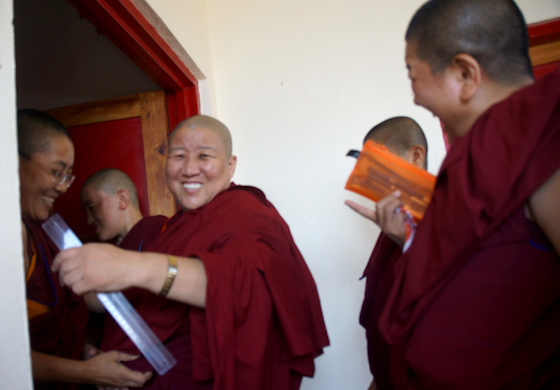Thanks to generous donors the 2018 Geshema Exams were fully funded!
In August 2018, generous donors made it possible for 44 nuns to take various levels of their four-year Geshema exams, by covering their costs of food and travel.
The rigorous written and oral (debate) exams were held at Dolma Ling Nunnery and Institute near Dharamsala from August 15-26. The nuns arrived in July for exam preparation and stayed at the nunnery for 6 weeks.
The 2018 Geshema exam results were announced in October and are as follows:
- Fourth and final year exams: All 10 nuns passed
- Third year exams: All 8 nuns passed
- Second year: 11 of 14 nuns passed
- First year: 8 of 12 nuns passed
The nuns who did not pass will have the option to re-sit their exams next year if they wish.
The Geshema Damcha
At the conclusion of this year’s inter-nunnery debate called the Jang Gonchoe, which was held at Kopan Nunnery in Nepal, the ten nuns who passed their fourth and final Geshema exams in August took part in a formal debate process called damcha.

Nuns line up to debate with the Geshemas in the damcha. This joyous and inspiring event was held for two days on November 3rd and 4th and was the final formal step in the Geshema graduation process. Photo courtesy of Tizi Sonam
Here’s a video by Tizi Sonam showing the part of the two-day damcha.
The 2018 Geshema Graduation
The 2018 Geshema Graduation Ceremony was held on November 5th at Kopan Nunnery with teachers and about 600 nuns from at least 9 nunneries in India and Nepal in attendance.
Here’s a video made by Tizi Sonam of the 2018 Geshema graduation ceremony at Kopan Nunnery.
The graduation this year of ten more Geshemas brings the total number of nuns with this degree to 37, including the German-born nun, Kelsang Wangmo, who was the first-ever Geshema.
This is the third year in a row in which a group of nuns completed the challenging four-year exam process. In 2016, Tibetan Buddhist nuns made history when 20 nuns received their degrees from His Holiness the Dalai Lama at a special ceremony in South India. Last year, another 6 nuns graduated at a ceremony at Dolma Ling Nunnery and Institute.
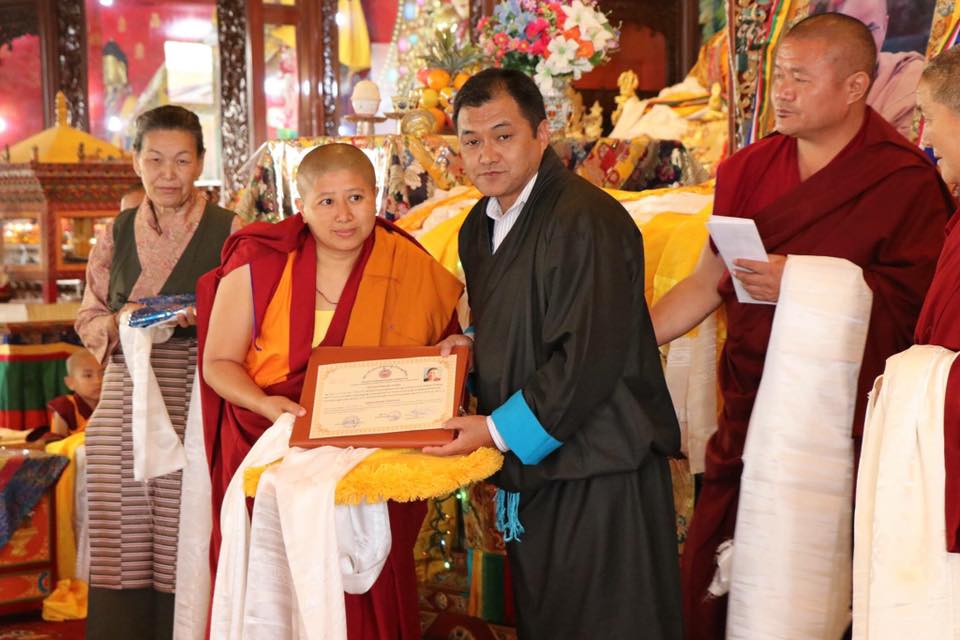
One of the ten nuns who received her Geshema degree in November 2018 at a special ceremony at Kopan Nunnery in Nepal. Photo courtesy of Tizi Sonam
The Geshemas are paving the way for other nuns to follow in their footsteps. This degree will make them eligible to assume various leadership roles in their monastic and lay communities reserved for degree holders and hence previously not open to women.
The Impact of Your Support of the Geshema Exams
The impact of your support goes far beyond providing funding to cover food and travel so the nuns could take their exams. We are deeply grateful to all our donors for helping nuns receive the same opportunities for deep study and practice as monks have always had and for supporting these devoted women to become teachers and to contribute to their communities.
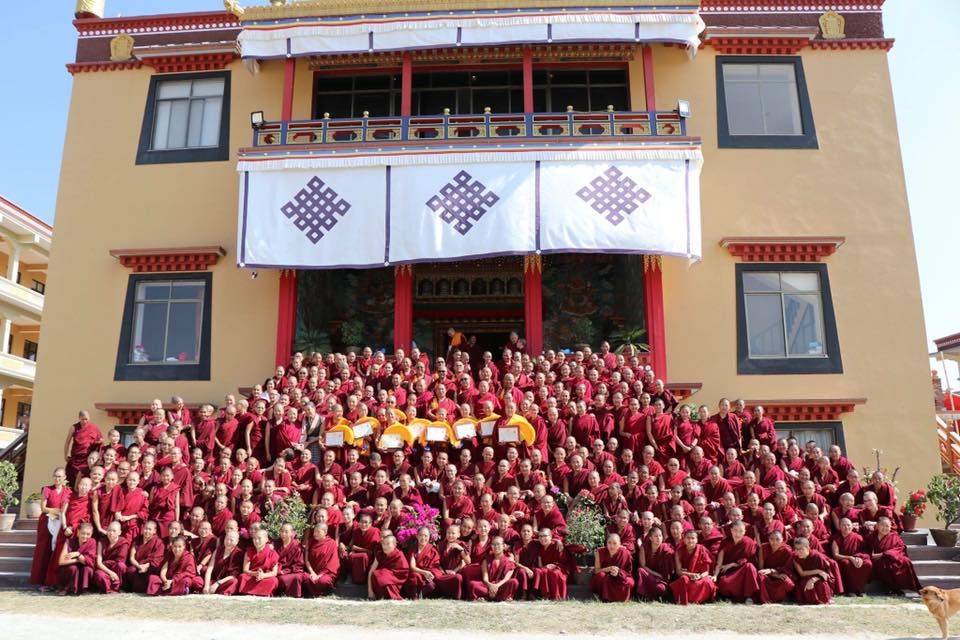
Ten new Geshemas surrounded by Tibetan Buddhist nuns on the steps of Kopan Nunnery in Nepal, following the Geshema graduation ceremony on November 5 2018. Photo courtesy of Tizi Sonam
By furthering the education of hundreds of Tibetan Buddhist nuns, you are also helping to foster the dharma for future generations and to preserve Tibet’s rich religion and culture at a time when it is seriously under threat.
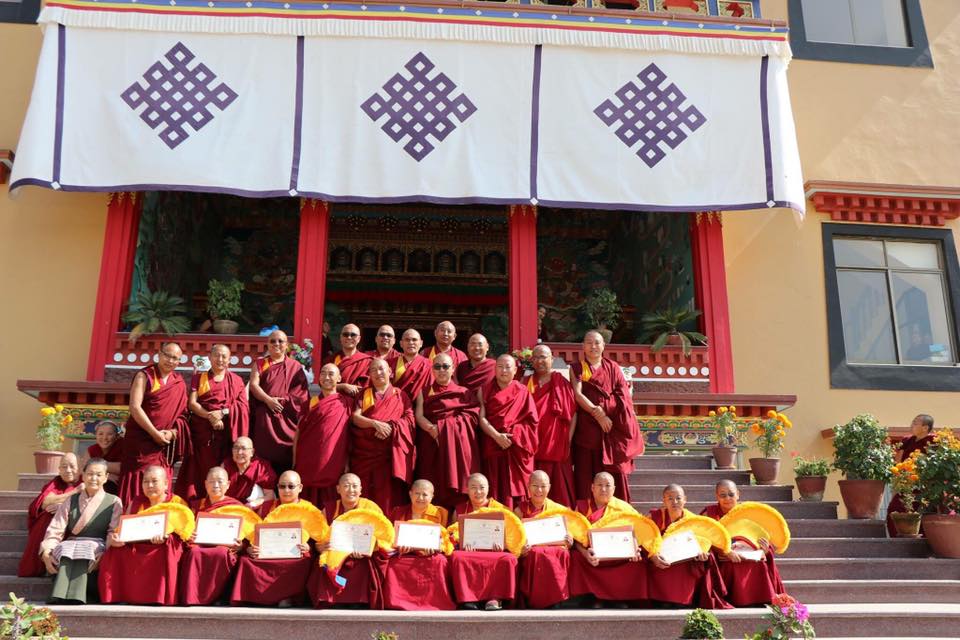
The ten Geshemas who graduated in November 2018. Photo taken on the steps of Kopan Nunnery in Nepal. Courtesy of Tizi Sonam
By helping to further educational opportunities, you are encouraging more intense study and practice, increasing the nuns’ knowledge and confidence, and empowering these dedicated women to become great teachers in their own right. Thank you!
Geshema Stories
You can read the inspiring story of one of the nuns here.
Here’s a video we made in July 2018 to support the 2018 Geshema Exams. (Note that in the video and earlier reports we said that 46 nuns were taking their exams in 2018. However, one nun scheduled to take her first-year exams had to postpone and return home to care for her ailing mother.)
The Geshema exams were held at Dolma Ling Nunnery and Institute from August 15-26. All the nuns taking exams gathered at Dolma Ling on July 15, a month in advance, to study together and make their final exam preparations. The 45 Geshema candidates came from four nunneries: Geden Choeling, Jangchup Choeling, Kachod Gyakhil Ling, and Dolma Ling.
About the Geshema Degree
The Geshema degree (or Geshe degree for monks) is roughly equivalent to a PhD in Tibetan Buddhism. This highest degree was, until recently, only open to men. Now Tibetan Buddhist nuns are making history. In the last two years, 26 Tibetan Buddhist nuns have earned this degree.
The Geshemas are paving the way for other nuns to follow in their footsteps. This degree will make them eligible to assume various leadership roles in their monastic and lay communities reserved for degree holders and hence previously not open to women.
Just before the exams started, the candidates received messages of good luck from around the world.
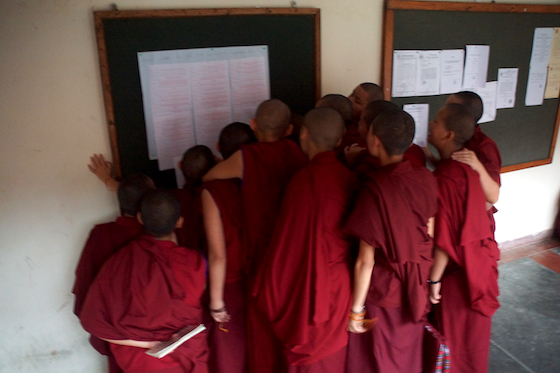
Nuns cluster around the notice board at Dolma Ling Nunnery to read the messages of good luck sent to the Geshema candidates. The good wishes were felt by all the nuns. Photo by the Nuns’ Media Team.
The 2018 Geshema Exams: Subjects and Examiners
Each morning, nuns from two of the four levels completed written papers from 9 a.m. to noon, while nuns from the other two levels underwent debate exams. In the afternoons, from 2 to 6 p.m., the examinees gathered for their debate sessions in front of the examiners.
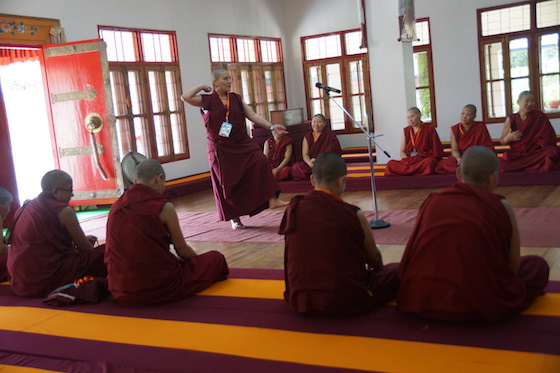
A nun debates as part of her Geshema exams. Providing opportunities for the nuns to debate has been a critical part of their education to reach this highest degree. The next major event for the nuns is the annual inter-nunnery debate, called the Jang Gonchoe, which will take place this year at Kopan Nunnery in Nepal.
Tibetan Buddhist philosophy is one of the major subjects for the Geshema candidates, but the nuns were examined on other subjects as well. In philosophy, nuns taking their first- and second-year exams were tested on Perfection of Wisdom (Pharchin) and Middle Way (Madhyamika), while third-and fourth-year examinees were tested on Vinaya (Dhua) and Treasury of Knowledge (Abhidharma). All exams were followed by debate sessions. In addition to their other exams, nuns in years 1-3, were tested on Tibetan grammar and science. Nuns taking their final year exams were tested on science and history. Each of the final-year candidates also had to write, in advance, a 50-page thesis and they were examined on their thesis papers during the Geshema exams.
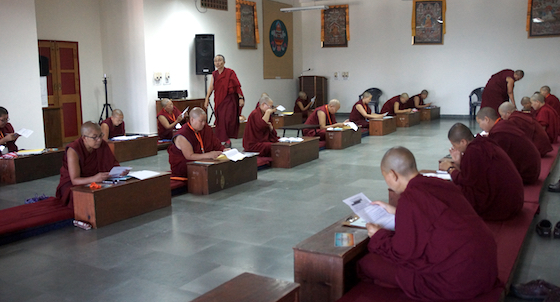
Each year, the two weeks of Geshema exams involve both written exams and oral (debate) exams. Nuns must complete 4 years of exams to earn their Geshema degree, equivalent to the Geshe degree for monks.
This year, the philosophy exam questions were prepared by Geshes from Drepung Loseling and Gomang monasteries in South India. The science question papers were prepared by staff at the Library of Tibetan Works and Archives. The Tibetan and history exam questions were written and marked by the College for Higher Tibetan Studies at Sarah. All of the question papers were sealed and only opened when the nuns were seated in the exam hall. Completed answer sheets were collected and sent back to the various examiner centers. The secured answer sheets on philosophy were checked first at one monastery and then sent to the next to be rechecked.
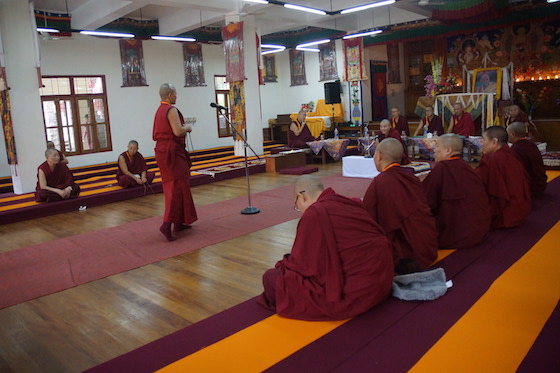
Nun debating in front of the examiners as part of her Geshema exams, August 2018. Photo by the Nuns’ Media Team.
The nuns were examined on debating by four Geshes, one each from Sera Je, Sera Mey, Ganden Shartsey, and Gaden Shangtsey monasteries, all located in South India. There are different examiners each year.
Wishing all the nuns the very best! We will share the summary results as soon as possible.
Thank you for helping the nuns earn their Geshema Degrees!
Learn about the nuns’ Current Needs here.
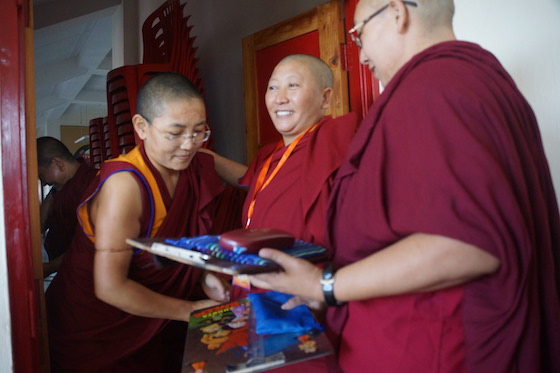
Entering the exam hall. Photo by the Nuns’ Media Team.

